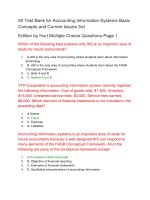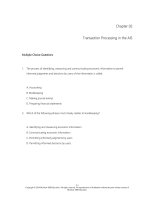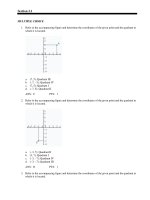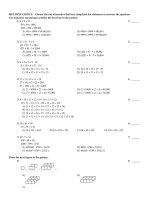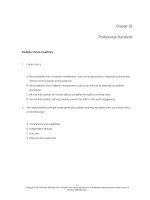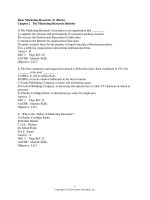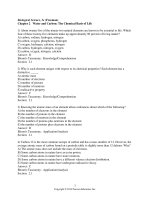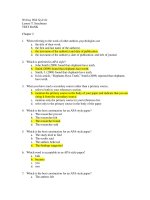Human biology concepts and current issues with masteringbiology 6th edition johnson test bank
Bạn đang xem bản rút gọn của tài liệu. Xem và tải ngay bản đầy đủ của tài liệu tại đây (341.99 KB, 14 trang )
MULTIPLE CHOICE. Choose the one alternative that best completes the statement or answers the question.
1) Which of the following characteristics applies to both living organisms and nonliving things?
1) _______
A) have the ability to store energy for later use
B) are capable of growth
C) are made up of cells
D) are capable of reproduction
E) are made up of matter
2) ________ is the study of matter and the energy that causes matter to combine, break apart and
recombine in everything living and non-living.
A) Geology
B) Biology
C) Chemistry
D) Physics
2) _______
3) ________ is the capacity to do work the capacity to cause some change in matter.
A) Atom
B) Energy
C) Molecule
D) Matter
3) _______
4) A mad scientist has ripped apart an atom and collected all the subatomic particles located in the
nucleus of the atom. Which of the following has he collected?
A) neutrons and electrons
B) protons and neutrons
C) electrons
D) protons
E) electrons and protons
4) _______
5) Which of the following is true regarding the structure of the atom?
A) The nucleus is composed of equal numbers of positively charged particles and negatively
charged particles.
B) Most of the mass of an atom is due to its protons and neutrons.
C) All electrons are located at the same distance from the nucleus.
D) Neutrons carry a negative charge.
E) In small elements, such as carbon, electrons have a positive charge; in larger elements, such
as barium, electrons have a negative charge.
5) _______
6) Isotopes of an element have the same atomic number as the more common atoms, but different
atomic mass because
A) isotopes contain more neutrons than the more common atoms.
B) isotopes absorb water from the surrounding environment.
C) isotopes contain more electrons than the more common atoms.
D) isotopes contain more protons than the more common atoms.
6) _______
7) The total number of protons and neutrons in an atom can best be determined by
A) the subscript number following the chemical symbol
B) the chemical symbol
C) atomic mass
D) atomic number
E) the charge of the atom
7) _______
8) Isotopes of an element have the same ________, but different ________.
A) number of neutrons, numbers of protons
B) name, chemical symbols
C) atomic mass, atomic numbers
D) atomic number, atomic masses
8) _______
E) number of electron shells, numbers of protons
9) Radioisotopes have a number of uses in science and medicine. These uses include
A) providing the power supply in heart pacemakers.
B) repairing damaged heart tissue.
C) dating fossils and treating cancer.
D) treating asthma and regulating nerve transmission.
E) curing diabetes.
9) _______
10) Carbon has an atomic number of 6 and an atomic mass of 12. Therefore, carbon has ________
electrons and ________ neutrons.
A) 6, 6
B) 6, 12
C) 2, 10
D) 12, 12
E) 12, 6
10) ______
11) Which of the following is true regarding electrons, shells, and energy?
A) As an electron moves to a shell further from the nucleus, it loses energy.
B) Electrons are located in shells around the nucleus.
C) The innermost electron shell has the most potential energy.
D) In order for an electron to move closer to the nucleus, it must absorb energy.
E) Electrons are attracted to each other because they have the same charge.
11) ______
12) Which of the following is a molecule?
A) C
B) O
12) ______
C) NaCl
D) N
E) Lead
13) A molecule of water forms when one oxygen binds with two hydrogen atoms, completely filling
the outershell of the hydrogens and oxygen. The type of bond linking the atoms together is
A) ionic.
B) polar.
C) covalent.
D) hydrogen.
E) disulfide.
13) ______
14) Ions in body fluids of a human are referred to as
A) atoms.
B) electrolytes.
14) ______
C) isotopes.
D) osmolytes.
15) Which of the following is true regarding water?
A) Each molecule of water consists of two atoms of hydrogen and one atom of oxygen
covalently bonded to each other.
B) Water is a type of ion.
C) The oxygen side of the water molecule is partially positive.
D) Water molecules are attracted to each other by ionic bonds.
E) Electrons are shared equally between the atoms of water.
15) ______
16) Which of the following is true concerning hydrogen bonds?
A) The bonds break when water enters a vapor state and remain broken as long as water
molecules remain in the gas phase.
B) Hydrogen bonds hold strands of DNA together.
C) They are weak bonds that form between water molecules in liquid form.
D) All of the above are correct.
16) ______
17) Molecules such as water that are electrically neutral overall but still have partially charged
regions are referred to as
A) ions.
B) isotopes.
C) polar molecules.
D) covalently charged.
E) electrolytes.
17) ______
18) Investigators at the National Institutes of Health examined the sales trends of five dietary
supplements before and after the publication of negative research results. There were no
significant declines in sales of four of five of the dietary supplements after published reports that
the supplements were ineffective. However, sales of a fifth supplement, vitamin E, dropped by
more than 33%. Researchers speculated that the drop in sales of only one of the five supplements
could be due to
A) the report simply not being heard or read by the public as a whole.
B) vitamin E has more negative side effects than the other supplements.
C) supplements like vitamin E are recommend more frequently by physicians to their patients.
D) vitamin E serves less useful purposes than the other supplements.
E) the higher cost of vitamin E in relation to the other dietary supplements examined.
18) ______
19) Water is an excellent solvent for biological systems because
A) it can maintain a relatively unstable temperature for chemical reactions to occur.
B) water is a semi-solid at body temperature preventing it from flowing freely through the
human body.
C) the polar nature of water prevents reassociation of ions once dissolved.
D) it can form covalent bonds with molecules once dissolved.
19) ______
20) A solution with a pH of 6 has ________ times as many hydrogen ions as a solution with a pH of
7.
A) 100,000
B) 10
C) 1,000
D) 10,000
E) 100
20) ______
21) A student measuring the pH of the water in a fish tank found it to have a pH of 8. Which of the
following statements is true regarding that solution?
A) The water does not contain hydrogen ions.
B) The water is more alkaline than a solution with a pH of 10.
C) The water contains equal numbers of hydrogen ions and hydroxyl ions.
D) The water is highly acidic.
E) The water is alkaline.
21) ______
22) Body fluids in humans have a high buffering capacity because
A) even modest shifts in pH can severely alter the physiology of cells.
B) it is the natural result of water as a solvent.
C) shifts in blood pH are required to maintain homeostasis.
D) it promotes hydrogen bonding between water molecules in biological fluids.
22) ______
23) Which of the following is true regarding carbon?
A) It is most stable when its outermost shell is filled with eight electrons
B) It is capable of forming strong hydrogen bonds with other elements
C) It can form molecules that branch in many directions
D) It is found in inorganic molecules
E) It is an ideal solvent in living systems
23) ______
24) Which of the following is true regarding macromolecules?
A) Cells produce macromolecules by the process of hydrolysis.
B) Cells cannot use macromolecules to signal other cells.
C) Cells use certain macromolecules to store energy.
D) Macromolecules are produced by hydration synthesis.
E) An example of a macromolecule is H2O.
24) ______
25) Hydrolysis reactions are important in biological systems
A) due to their role in the breakdown of food molecules during digestion.
B) since these reactions are associated with recycling of materials and elimination of
substances from the body.
C) because they promote the release of energy when covalent bonds are broken.
D) All of the above are correct.
25) ______
26) Carbohydrates are characterized by
A) being indigestible by most organisms.
B) being composed of carbon, hydrogen, and nitrogen.
C) releasing energy when their peptide bonds are broken.
D) possessing a carbon backbone that is hydrated.
26) ______
27) Which of the following is a very important source of energy for cells?
A) starch
B) cellulose
C) glucose
D) deoxyribose
E) ribose
27) ______
28) Which of the following is an oligosaccharide?
A) starch
B) DNA
C) ribose
28) ______
D) maltose
E) glucose
29) Sucrose is an oligosaccharide made up of which of the following sugars?
A) glucose and glucose
B) starch and glycogen
C) deoxyribose and ribose
D) glucose and fructose
E) maltose and glucose
29) ______
30) Lipids are important to biological systems because
A) most help to buffer aqueous solutions in the body.
B) some lipid types are potentially large sources of energy to perform cellular work.
C) all lipids are very soluble in water.
D) they are solid at body temperature so they stabilize membranes.
30) ______
31) Which of the following molecules is stored in adipose tissue and serves as an important source
of energy for the human body?
A) triglycerides
B) glucose
C) glycogen
D) phospholipids
E) steroids
31) ______
32) Which of the following is a lipid?
A) Maltose.
B) Alanine.
32) ______
C) Cholesterol.
D) Glycogen.
33) The most important physical characteristic of lipids with regard to living organisms is that they
A) dissolve easily in water.
B) are very large and therefore difficult to store.
C) are hydrophobic.
D) are typically a form of waste product that is difficult to eliminate.
33) ______
E) are more dense than water.
34) Pancreatic cells make insulin, which is a type of protein. These cells use ________ in order to
synthesize insulin by the process of ________.
A) nucleotides, condensation.
B) monosaccharides, dehydration synthesis.
C) fatty acids and glycerol, hydrolysis.
D) oligosaccharides, hydrolysis.
E) amino acids, dehydration synthesis.
34) ______
35) Each amino acid is composed of a central carbon that forms covalent bonds with four other
atoms/molecules. These atoms/molecules include all but a(n)
A) carboxyl group.
B) R group.
C) A group.
D) hydrogen atom.
E) amino group.
35) ______
36) Disulfide bonds are most characteristic of which of the following levels of protein structure?
A) quaternary
B) secondary
C) enzymatic
D) primary
E) tertiary
36) ______
37) Which of the following is a function of a protein?
A) acts as a catalyst
B) provides energy for a muscle contraction
C) is a major subunit of cellulose
D) primary structural component of a cell membrane
E) stores genetic material
37) ______
38) Students seeking a "boost" of energy to pull an all-nighter should consider a caffeine tablet
instead of "energy shot" because
A) energy shots are generally bad tasting by comparison to a caffeine tablet.
B) caffeine tablets usually contain more caffeine.
C) the tablets are much cheaper to purchase.
D) all of the ingredients in an energy shot are not provided by the manufacturer, so you really
are not entirely sure what you are drinking.
E) All of the above are correct.
38) ______
39) Which of the following is true regarding enzymes?
A) Enzymes slow the rate of chemical reactions in living systems.
B) Enzymes convert products into reactants.
C) Enzymes are consumed in a chemical reaction, so an organism must constantly replace
these enzymes.
D) Enzyme function is not affected by changes in temperature or pH.
E) Each enzyme catalyzes one specific reaction or group of reactions.
39) ______
40) Which of the following is needed to synthesis a new strand of DNA?
A) lipids
B) GTP
40) ______
C) RNA
D) nucleotides
E) amino acids
41) DNA differs from RNA in that DNA
A) is made up of nucleotides.
B) contains cytosine.
C) contains deoxyribose.
D) contains phosphates.
E) is single stranded.
41) ______
42) A research student is analyzing the nucleic acid of a virus. He finds that the nucleic acid contains
thymine. From this it can be concluded that the nucleic acid
A) is a strand of DNA.
B) contains ribose.
C) is double stranded.
D) is actually a protein.
E) contains glucose.
42) ______
43) Which of the following is true regarding nucleotides?
A) DNA nucleotides are assembled into RNA by the process of dehydration synthesis.
B) There are three different DNA nucleotides.
C) DNA nucleotides contain deoxyribose; RNA nucleotides contain sucrose.
D) A DNA nucleotide could be made up of ribose, a phosphate, and cytosine.
E) Nucleotides are bonded together by covalent bonds between the sugars and the
phosphates.
43) ______
44) Which of the following occurs when a phosphate is removed from an ATP molecule?
A) Oxygen produced in the reaction causes the molecule to explode.
B) Energy is added to the ATP molecule to form ATP4.
C) Energy is released for cell work.
D) Fat is converted to protein.
E) Chemical reactions stop in a cell due to lack of an energy source.
44) ______
45) Proteins that function as a catalyst
A) maintain primary structure.
B) slow down the speed at which chemical reactions occur, but do not alter the final products
formed.
C) are referred to as enzymes.
D) facilitate chemical reactions by altering the final products formed.
E) can only participate in reactions that synthesize new products.
45) ______
TRUE/FALSE. Write 'T' if the statement is true and 'F' if the statement is false.
46) Electrons are smaller than protons, negatively charged, and orbit the nucleus.
46) ______
47) All matter is made up of atoms.
47) ______
48) If the number of protons in an atom equals the number of electrons in the atom, the atom is
electrically neutral.
48) ______
49) Atoms with either more or fewer neutrons than the usual number for an element are referred to
as isotopes.
49) ______
50) Potential energy is energy that has not been used yet, but has the potential to do work.
50) ______
51) When water is released from a dam, potential energy is converted to kinetic energy.
51) ______
Figure 2.1 shows water molecules in close proximity to one another. Use this figure to answer the following
questions.
Figure 2.1
52) The type of bond indicated by the dotted lines is a hydrogen bond.
52) ______
53) The difference between water molecules in liquid water versus water molecules in ice is in the
number of covalent bonds that form.
53) ______
54) During intense exercise, you produce a lot of heat energy yet your body temperature rises only
in small increments. This temperature stability is because water in body fluids releases the heat
very quickly.
54) ______
55) One of the most important buffer pairs in blood is carbonic acid and bicarbonate because they
regulate the pH of blood by absorbing and releasing hydrogen ions as needed.
55) ______
56) The more buffers present in a body fluid, the more likely that your blood pH will change after
absorbing nutrients during digestion.
56) ______
57) Because carbon requires four additional electrons to fill its outermost shell, it has a natural
tendency to form four covalent bonds with other atoms, making it an ideal element for forming
structures in living cells.
57) ______
Use Figure 2.2 to answer the following questions.
Figure 2.2
58) The figure above shows a triglyceride that contains unsaturated fatty acids.
58) ______
59) The diagram shows a triglyceride with fatty acid tails representing a fat that is liquid at room
temperature.
59) ______
60) If the pH of your blood is lowered significantly, many proteins will not be able to fold correctly.
The result will be decreased enzyme function throughout the body.
60) ______
MATCHING. Choose the item in column 2 that best matches each item in column 1.
Match each of the following descriptions to the appropriate term.
61) a component of an atom that carries a
negative charge
A) lipids
61) ______
B) isotope
62) the smallest unit of matter that can
take part in a chemical reaction
62) ______
C) elements
63)
anything that has mass and occupies
space
D) amino acids
63) ______
E)
64) formed by chemical reactions
between atoms
matter
F)
molecule
64) ______
65) different forms of the same element
that differ in their atomic mass
G)
65) ______
electron
H)
66) steroids, triglycerides
nucleic acids
66) ______
molecules
67) ______
atom
68) ______
carbohydrates
69) ______
I)
67) matter that cannot be broken down
J)
68) DNA, RNA
K)
69) water, sodium chloride, carbon
dioxide
70) alanine, glycine, cysteine
70) ______
71) glucose, cellulose, glycogen
71) ______
Match the following:
72) a double strand of nucleotides; stores
genetic information
A) cellulose
72) ______
B) DNA
73) lipid that stabilizes membranes and is
a precursor to many hormones
73) ______
C) cholesterol
74)
dominant energy source used by cells
D) glucose
74) ______
75)
major structural polysaccharide
produced by plants
76) a molecule consisting of glycerol plus
fatty acid chains with two hydrogen
atoms per carbon atom; solid at room
temperature
75) ______
A) polypeptide
76) ______
B)
starch
C)
77) a polysaccharide composed of a long
chain of glucose molecules
saturated fat
78) a strand of 3 to 100 amino acids
SHORT ANSWER. Write the word or phrase that best completes each statement or answers the question.
Figure 2.3
77) ______
78) ______
Use the letters from Figure 2.3 to answer the following questions.
79) The subatomic particles, ________ and ________, have approximately the same mass.
79) _____________
80) Isotopes of this element would differ in the number of ________.
80) _____________
81) In order for this atom to be electrically neutral, the number of subatomic particles
labeled "A" in the diagram would have to equal the number of ________.
81) _____________
82) The label ________ points to a neutron.
82) _____________
83) In order for this atom to develop a positive charge, it would have to lose ________.
83) _____________
84) The number of subatomic particles ________ is the atomic number of that atom.
84) _____________
85) All things on earth are made up of ________, which is defined as anything that has mass
and occupies space.
85) _____________
86) The pure form of matter that cannot be broken down into a simpler form is a(n)
________.
86) _____________
87) Protons and neutrons are located in the ________ of an atom.
87) _____________
88) In the atom, electrons are located in "clouds" with negative charges around the nucleus;
these are called ________.
88) _____________
89) Isotopes that give off energy and emit particles are known as ________.
89) _____________
90) Foods and drinks that provide benefits beyond typically expected for nutrients are
called ________.
90) _____________
91) Water held behind a dam has a large amount of ________ energy.
91) _____________
92) Dietary supplements are not regulated by the U.S. Food and Drug Agency until the
supplement is proven ________.
92) _____________
93) An electrically charged molecule or atom is a(n) ________.
93) _____________
94) Molecules that are polar and attracted to water are ________; molecules that are
nonpolar and therefore not attracted to water are ________.
94) _____________
95) Evaporation of water from the skin results in a(n) ________ in body temperature.
95) _____________
96) Molecules that give up or donate hydrogen ions are ________.
96) _____________
97) The acidity or alkalinity of a solution can be measured in terms of ________.
97) _____________
98) Which solution has more free hydrogen ions: pH = 9 or pH = 3?
98) _____________
99) The normal pH of human blood falls within a range that is near a ________ pH.
99) _____________
100) A substance that helps to maintain a stable pH is a(n) ________.
100) ____________
101) Large organic molecules that are composed of thousands of smaller molecules bonded to
one another are known as ________.
101) ____________
102) The process by which cells break down organic macromolecules into their subunits is
________.
102) ____________
103) In order for a cell to produce a fat, it must have one molecule of ________ and three
________.
103) ____________
104) A diet rich in ________ fat is believed to contribute to the development of cardiovascular
disease.
104) ____________
105) The structure of a cell membrane includes a modified form of lipid called a ________.
105) ____________
106) The molecule that stores the set of instructions of a cell and directs everything a cell does
is
________.
106) ____________
107) The molecule with which an enzyme reacts is a(n) ________.
107) ____________
108) There are ________ different deoxynucleotides found in the human genome.
108) ____________
109) Plants produce a polysaccharide of made glucose known as ________ which is virtually
undigestable by most animals.
109) ____________
110) The universal energy source for cells is ________.
110) ____________
111) Certain nutrients and enzymes known as ________ are the body's natural defense
against oxygen free radicals.
111) ____________
ESSAY. Write your answer in the space provided or on a separate sheet of paper.
112) Describe how denaturing a protein alters the function of that protein.
113) Explain how water in your body helps to regulate body temperature following a long-distance bike ride.
114) In the human body, bicarbonate and carbonate ions work together to stabilize or buffer the pH of body
fluids. What would happen to your blood if these buffering agents were removed?
1)
2)
3)
4)
5)
6)
7)
8)
9)
10)
11)
12)
13)
14)
15)
16)
17)
18)
19)
20)
21)
22)
23)
24)
25)
26)
27)
28)
29)
30)
31)
32)
33)
34)
35)
36)
37)
38)
39)
40)
41)
42)
43)
44)
45)
46)
47)
48)
49)
50)
51)
E
C
B
B
B
A
C
D
C
A
B
C
C
B
A
D
C
C
C
B
E
A
C
C
D
D
C
D
D
B
A
A
C
E
C
E
A
E
E
D
C
C
E
C
C
TRUE
FALSE
TRUE
TRUE
TRUE
TRUE
52)
53)
54)
55)
56)
57)
58)
59)
60)
61)
62)
63)
64)
65)
66)
67)
68)
69)
70)
71)
72)
73)
74)
75)
76)
77)
78)
79)
80)
81)
82)
83)
84)
85)
86)
87)
88)
89)
90)
91)
92)
93)
94)
95)
96)
97)
98)
99)
100)
101)
102)
103)
TRUE
FALSE
FALSE
TRUE
FALSE
TRUE
FALSE
FALSE
TRUE
G
J
E
F
B
A
C
H
I
D
K
E
F
G
B
D
C
A
B, C
B
C
B
A
C
matter
element
nucleus
shells
radioisotopes
nutraceuticals
potential
unsafe
ion
hydrophilic, hydrophobic
decrease
acids
pH
pH = 3
neutral
buffer
macromolecules
hydrolysis
glycerol, fatty acids
104)
105)
106)
107)
108)
109)
110)
111)
112)
saturated
phospholipid
DNA
substrate (reactant)
four
cellulose
ATP
antioxidants
Denaturing a protein permanently disrupts protein structure. Ordinarily, if the protein shape is altered so is the
function of that protein. This can be seen with denatured enzymes that loose the ability to bind the substrate and
thus no chemical reaction can occur.
113) Water in body fluids is able to absorb heat without experiencing large temperature shifts. Water is also able to
"hold" the heat, so that when the warm fluid moves to the periphery of the body, the heat can be exchanged or
released into the environment. Perspiration is one means for the heat to be released from the body, which in turn
allows you to maintain a relatively constant body temperature.
114) Blood pH could not be regulated in the absence of this buffering pair. Anything absorbed or released from those
fluids that altered the hydrogen or hydroxyl ion content of blood would cause a pH change. For humans that
tightly regulate homeostasis, even relatively modest changes in blood pH can have devastating consequences.

